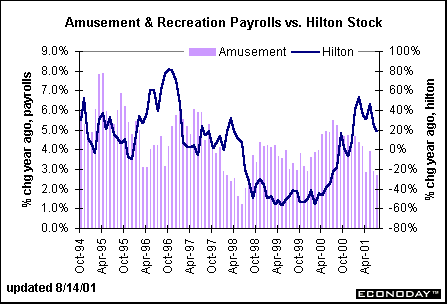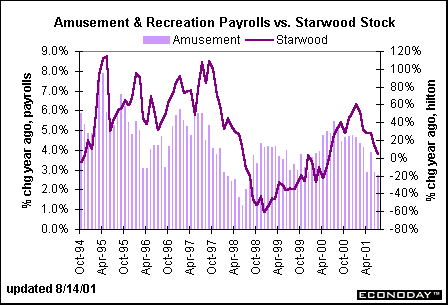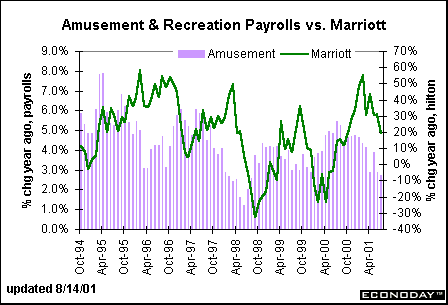Last week we found that a subcomponent of retail sales and food services showed a more consistent correlation with hotel stock prices than hotel & lodging payrolls. Intuitively, one would expect that payroll figures would correlate strongly with stock prices since they reflect the demand for hotel services. Perhaps the relationship wasn't as close as expected because companies tend to keep workers during a slowdown on concern that a pickup in demand would lead to high rehiring costs.
But we weren't entirely convinced that employment in the leisure industry wouldn't correlate with corporate profits and therefore stock prices. We decided we'd take another stab at it and went to a related industry - amusement and recreation payrolls. Amusement parks and recreation facilities are often away from home, meaning that consumers have to stay at hotels.
Indeed, the correlation between hotel stock prices and amusement & recreation payrolls is much stronger than with hotel & lodging payrolls. The hotel & lodging payrolls relationship primarily went awry in 1998 and 1999. While amusement and recreation payrolls didn't decline as much as the stock price for Hilton Hotels, you will note a dip in the rate of growth during that period.

The relationship between amusement & recreation payrolls is even stronger for Starwood Hotels and Resorts, evident in the chart below.

While it is useful to look at payrolls in hotel & lodging as well as amusement & recreation, the best correlation probably comes from the restaurant sector (retail sales and food services). (see Short Take, August 15)

The bottom line? We've looked at a variety of economic indicators to help us determine trends in the hotel industry. What can we conclude from this evidence? Both employment indicators (hotel & lodging, amusement & recreation) are still headed lower on a year-over-year basis. This suggests that employment and demand in the sector have not quite bottomed out. In contrast, the restaurant sales figures are starting to show some year-over-year gains. On the whole, the restaurant sales figures showed a better correlation to the stock prices of the three hotel companies in question (Hilton, Marriott and Starwood). Given that economic conditions have not quite bottomed, it may be a bit soon to expect a recovery in stock prices for these three hotel giants. But then again, it is well to remember that we want to buy stocks when prices are depressed, not when they are at their peak. But it certainly can be scary to buy in a bear market?!
Remember, we are not recommending that you purchase any of these stocks, but only offering a new way to analyze companies and industries by using common economic indicators that are reported regularly by the government.
(Do you wonder how we chose these particular companies for analysis? They are listed in Business Week's corporate scoreboard as part of the hotel industry. Historical stock prices were readily available on AOL.)
Evelina M. Tainer, Chief Economist, Econoday
| 